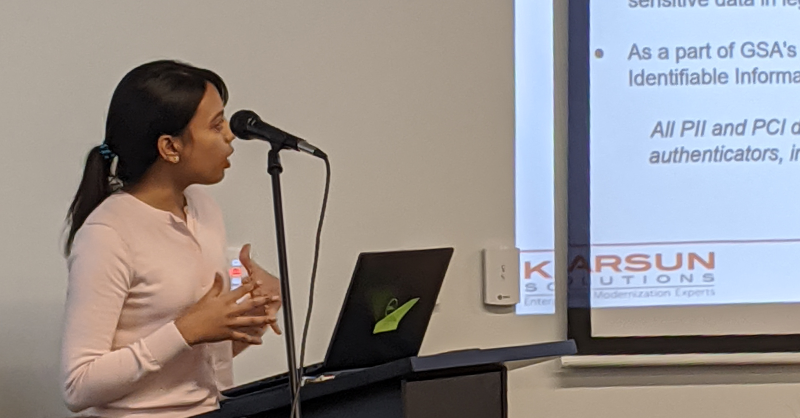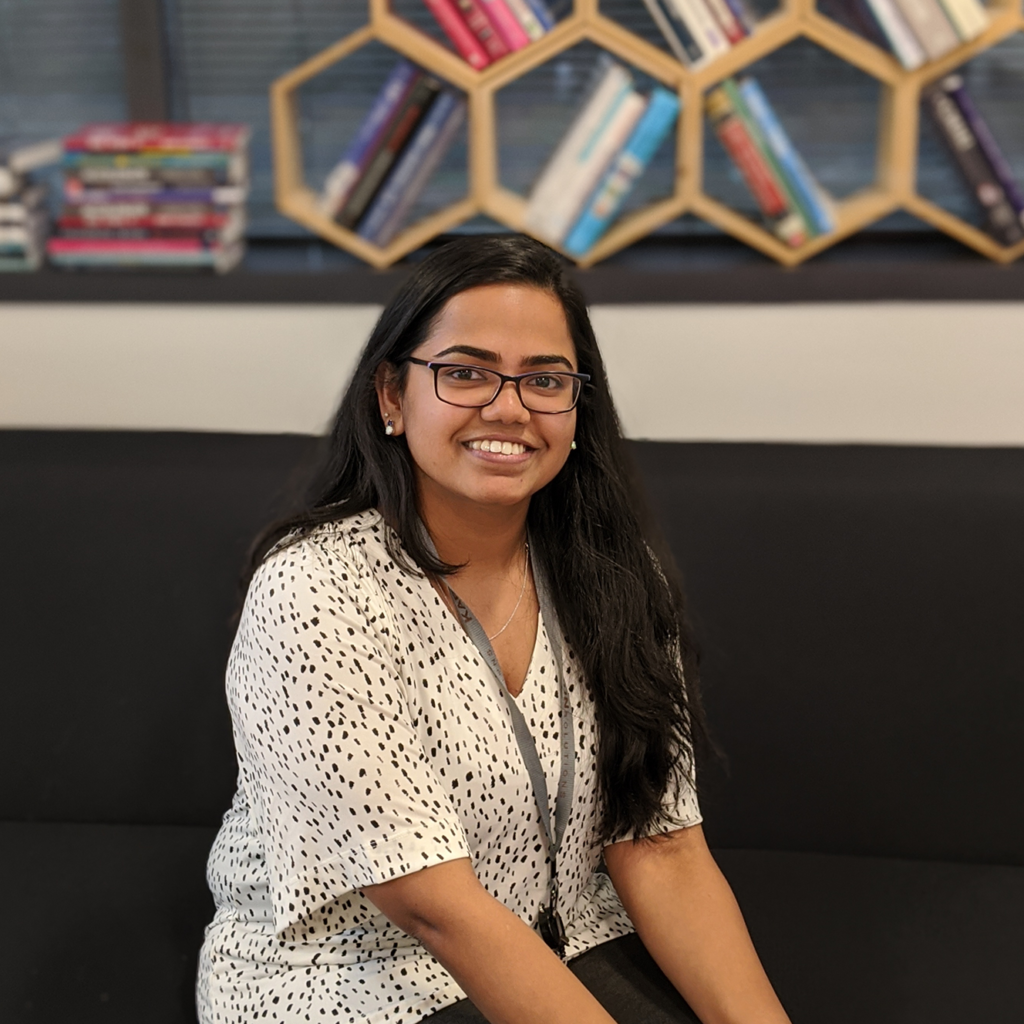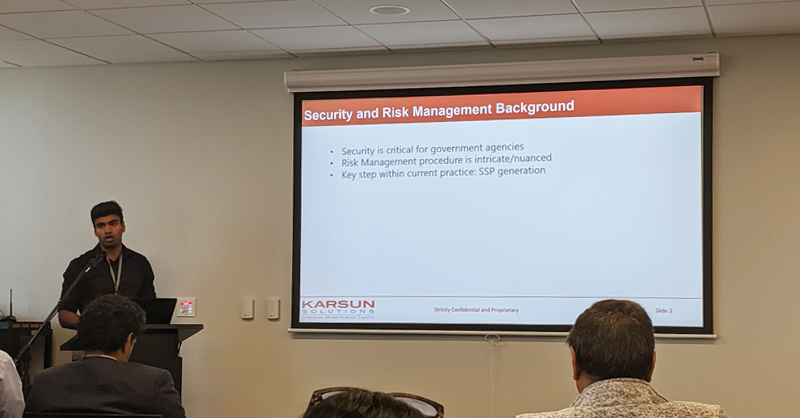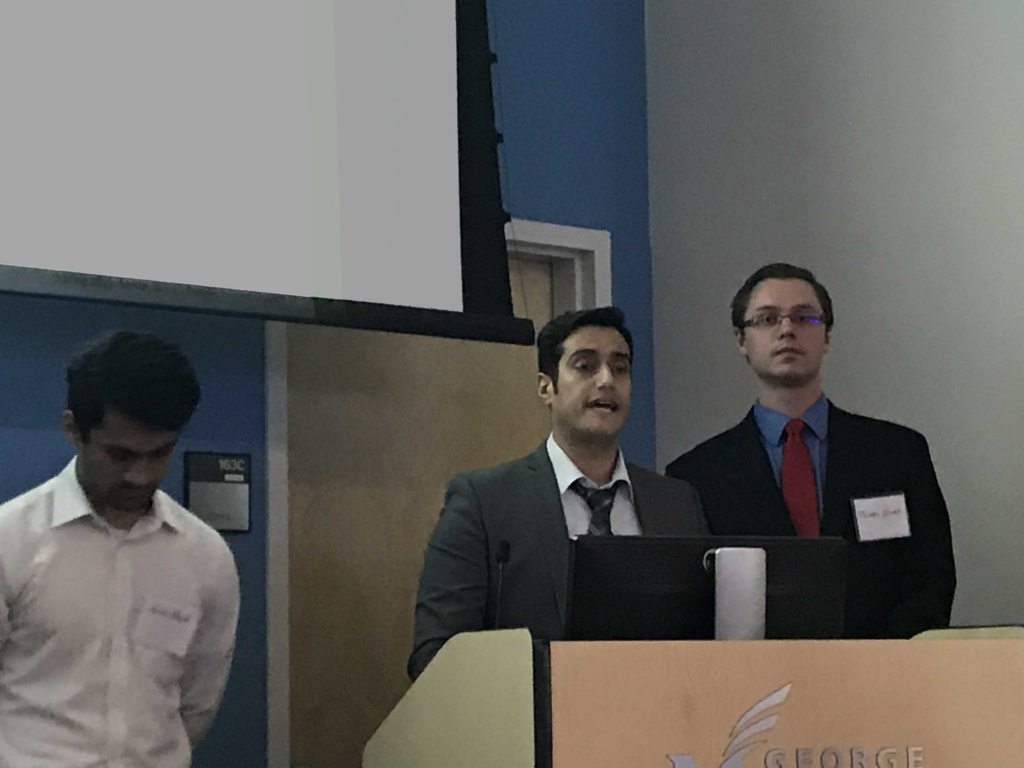Every year the Karsun Innovation Center (KIC) hosts a new Summer Intern class for college students in their junior year. Mentored by KIC practice advocates, they work alongside delivery teams prototyping solutions for real-life initiatives developed by Karsun. This year we introduced a new Student Intern class. Composed of exceptional high school and college students, these internship participants completed a series of technical challenges over a ten-week program. Additionally, each Student Intern selected an emerging technology topic to research throughout their time at Karsun.
Exploring Technology in Government
This new internship invited STEM students to explore different modern software development, cloud and data solutions implementations. Working in pairs, The ten-week session opened with a challenge designed to help students think about how the federal government uses technology. In this code-a-thon, students built a web application with the potential to solve a common government technical problem.
Applying Machine Learning
Similar to the Summer Interns working on the synthetic data portal, the Student Interns also had an opportunity to work on ML/AI-related work as part of their internships. In that technology challenge, students trained machine learning models to identify images of collapsed lungs. Working alongside Innovation Center experts is a key benefit of our intern programs.
Bringing It Together
The student interns wrapped up their session with a research paper. They selected from a list of topics ranging from robotic process automation (RPA) to digital twins. They explored beyond the industries where Karsun performs work to understand how these tools are implemented in exciting ways across the government.
The student interns also worked with mentors throughout the program. The mentor to each student is a graduate from a previous intern cohort and a current Karsun employee. Just as we are excited to see the careers pursued by our graduating Summer Interns, we are also excited to see what the future holds for these emerging STEM experts.
About the Karsun Innovation Center Internship Programs
The Karsun Innovation Center hosts an annual summer internship program for computer science or equivalent students, typically in their junior year of college. Occasionally, internship opportunities are available for recent graduates. In 2022, the center added a Student Internship cohort to support exceptional high school and early college students. Information on current internship openings is available at KarsunCareers.com.
Every summer Karsun embeds interns in our Innovation Center to work alongside our technology experts, prototyping solutions to support our customers. 2022 Intern Akhilesh Varanasi used synthetic data to address a common privacy concern, personally identifiable information (PII.) Using synthetic data, an artificial set of data is created to perform ML/AI work preventing exposure of sensitive PII. In the interview below, Akhilesh describes his experience in the Karsun Innovation Center and his synthetic data internship project.
First, please tell us about yourself. Where are you going to school? What are you studying? What do you like to do in your free time?
Hi all! My name is Akhilesh Varanasi. I’m currently a rising junior at the University of Washington in Seattle, where I’m a double major in Computer Science and Astronomy. In my free time, I like reading and playing basketball.
Could you share a little bit about the project you worked on as part of this internship? What challenges does it solve? What technologies and tools are you using?
For most of my internship, I worked on the Synthetic Data project. The purpose of this project was to create PII anonymized ‘fake’ data for Machine Learning/Artificial Intelligence use cases. I mostly worked with Python, the Synthetic Data Vault libraries, and graphing frameworks like matplotlib. My main tasks were to create accurate Synthetic Data models and to find generic ways to graphically represent all forms of tabular data. I also worked with AWS Lambda and the AWS CLI to run tests.
What is your favorite part about working with the Karsun Innovation Center? Is there a weekly meeting or ritual you enjoy? The opportunity to learn more or get a new certification?
My favorite parts of working at the Karsun Innovation Center were the input I had in the development process and the team I worked with. I always felt like my opinion was respected at meetings, even in a room full of people that were far more experienced than me. I also had a great time working with the team, everyone was so willing to help each other and it felt like a comfortable, collaborative environment.
What is the biggest takeaway from your experience as an intern at Karsun?
My biggest takeaway from my experience at Karsun is that taking initiative is important. To be a valuable part of a team I have to research topics by myself and come up with goals to structure my approach to a problem.
Akhilesh was mentored by Srikanth Devarajan, Director, Karsun Innovation Center Data Practice.
Every summer Karsun embeds interns in our Innovation Center to work alongside our technology experts, prototyping solutions to support our customers. 2022 Intern Akhilesh Varanasi used synthetic data to address a common privacy concern, personally identifiable information (PII.) Using synthetic data, an artificial set of data is created to perform ML/AI work preventing exposure of sensitive PII. In the interview below, Akhilesh describes his experience in the Karsun Innovation Center and his synthetic data internship project.
First, please tell us about yourself. Where are you going to school? What are you studying? What do you like to do in your free time?
Hi all! My name is Akhilesh Varanasi. I’m currently a rising junior at the University of Washington in Seattle, where I’m a double major in Computer Science and Astronomy. In my free time, I like reading and playing basketball.
Could you share a little bit about the project you worked on as part of this internship? What challenges does it solve? What technologies and tools are you using?
For most of my internship, I worked on the Synthetic Data project. The purpose of this project was to create PII anonymized ‘fake’ data for Machine Learning/Artificial Intelligence use cases. I mostly worked with Python, the Synthetic Data Vault libraries, and graphing frameworks like matplotlib. My main tasks were to create accurate Synthetic Data models and to find generic ways to graphically represent all forms of tabular data. I also worked with AWS Lambda and the AWS CLI to run tests.
What is your favorite part about working with the Karsun Innovation Center? Is there a weekly meeting or ritual you enjoy? The opportunity to learn more or get a new certification?
My favorite parts of working at the Karsun Innovation Center were the input I had in the development process and the team I worked with. I always felt like my opinion was respected at meetings, even in a room full of people that were far more experienced than me. I also had a great time working with the team, everyone was so willing to help each other and it felt like a comfortable, collaborative environment.
What is the biggest takeaway from your experience as an intern at Karsun?
My biggest takeaway from my experience at Karsun is that taking initiative is important. To be a valuable part of a team I have to research topics by myself and come up with goals to structure my approach to a problem.
Akhilesh was mentored by Srikanth Devarajan, Director, Karsun Innovation Center Data Practice.
Every summer Karsun embeds interns in our Innovation Center to work alongside our technology experts, prototyping solutions to support our customers. 2022 Intern Akhilesh Varanasi used synthetic data to address a common privacy concern, personally identifiable information (PII.) Using synthetic data, an artificial set of data is created to perform ML/AI work preventing exposure of sensitive PII. In the interview below, Akhilesh describes his experience in the Karsun Innovation Center and his synthetic data internship project.
First, please tell us about yourself. Where are you going to school? What are you studying? What do you like to do in your free time?
Hi all! My name is Akhilesh Varanasi. I’m currently a rising junior at the University of Washington in Seattle, where I’m a double major in Computer Science and Astronomy. In my free time, I like reading and playing basketball.
Could you share a little bit about the project you worked on as part of this internship? What challenges does it solve? What technologies and tools are you using?
For most of my internship, I worked on the Synthetic Data project. The purpose of this project was to create PII anonymized ‘fake’ data for Machine Learning/Artificial Intelligence use cases. I mostly worked with Python, the Synthetic Data Vault libraries, and graphing frameworks like matplotlib. My main tasks were to create accurate Synthetic Data models and to find generic ways to graphically represent all forms of tabular data. I also worked with AWS Lambda and the AWS CLI to run tests.
What is your favorite part about working with the Karsun Innovation Center? Is there a weekly meeting or ritual you enjoy? The opportunity to learn more or get a new certification?
My favorite parts of working at the Karsun Innovation Center were the input I had in the development process and the team I worked with. I always felt like my opinion was respected at meetings, even in a room full of people that were far more experienced than me. I also had a great time working with the team, everyone was so willing to help each other and it felt like a comfortable, collaborative environment.
What is the biggest takeaway from your experience as an intern at Karsun?
My biggest takeaway from my experience at Karsun is that taking initiative is important. To be a valuable part of a team I have to research topics by myself and come up with goals to structure my approach to a problem.
Akhilesh was mentored by Srikanth Devarajan, Director, Karsun Innovation Center Data Practice.

Solving difficult problems drives the work at Karsun Solutions. One of those difficult problems included transitioning Karsun’s internship program, formerly based out of its Herndon, Virginia Headquarters, to a fully remote program. In this new virtual internship format, interns join a mentorship centered program designed to keep them connected and innovating even as they work remotely.
At Karsun Solutions the Internship Program is affiliated with the Karsun Innovation Center or KIC. As part of their virtual internship, each participant pairs up with a mentor from the KIC. Beyond introducing them to an innovative IT modernization culture, mentors provide continuous feedback so that interns may further develop and improve their skills.
Building a Digital Workplace with Karsun Konnect
As members of the Innovation Center, interns will envision the future of remote work. They will work directly with Karsun’s new digital workplace initiative, Karsun Konnect. This is a real-world application, designed for Karsun employees, which is created and maintained by the KIC. Upon completion, Konnect will include both an InnerSource library and provide workflow enhancements to the corporate functions serving Karsun teams.
Their work will involve collaborating with various stakeholders within the Operations, Talent, Human Resources, and Business Development teams, to identify areas of digital transformation. As part of this experience, interns will identify business requirements. Then they will learn to implement low-cost and efficient solutions within the identified constraints. Based on the business needs and feasibility, they next select appropriate software solutions. These solutions might include chatbots and other applications developed on no-code/low-code frameworks available under the Konnect platform.
An Immersive Innovation Center Experience
Interns will also participate in daily remote stand-ups and demo their projects weekly to Innovation Center leadership. Although remote these interns will also have the opportunity to present and engage with Karsun’s monthly virtual Innovation Town Halls. They may also participate in virtual training through monthly dojos and brown bags hosted by the KIC.
Some may continue their projects after completing their program. Graduates of three previous intern classes now continue their projects in the Karsun Innovation Center as full-time employees. Several of these former internship participants plan to participate as mentors or advisors for this year’s class. The KIC internship program is one of several outreach events designed to engage future IT professionals. In addition to engaging in other college hiring programs the organization previously sponsored a senior capstone project at George Mason University and hackathons at the University of Oklahoma and University of Southampton. Karsun accepts internship applications in the spring.
Through our Karsun Innovation Center (KIC) Internship Program each of our interns has a voice in the future of our company. These interns support the Research and Development teams rolling out new tools and processes across our organization. In the fall of 2019, we launched an Innovation Town Hall series. And once again our interns led the way. Presenting their projects to Karsun employees at these monthly meetings, they not only demoed new innovations currently in production they also explained customer pain points and opportunities for future enhancements. From SQL proxies to artificial intelligence, each of our interns had new innovative projects to share.
Interns learn and grow during their time with us. Shadowing team members in our Innovation Center and customer delivery teams, they participate in cross-functional projects, sharing their insights with teams across the company. They also sit down with senior executives, learn about their background, and dig a little deeper into their leadership experience as they share advice on things that helped them along the way.
The SQL Proxy Approach to Data Encryption with Anuraadha Kandadai
Anuraadhaa Kandadai is a recent graduate from Duke University with an MS in Economics and Computation. Over the past summer, she worked as an Intern at KIC. During her time at Karsun Anuraadha presented at both Karsun’s internal Innovation Town Hall and at DataOps NoVa, a local Meetup hosted by Karsun Solution’s Data Practice.

Anuraadhaa presented on the SQL Proxy Approach to Data Encryption. Her demo was a behind the scenes look at the SQL Proxy components followed by use cases for encryption. She also highlighted the challenges with complete encryption.

Apart from her work in the Karsun Innovation Center, she enjoys doing DIY art and craftwork. On her time in the Innovation Center, she said,
“For someone with a mixed background (economics and CS), I came in with an open mind and with a primary goal to learn as much as possible. After 3 months of the internship, I can confidently say that learning as an intern at KIC was immense. The range of work from working on Robotic Process Automation to building a “dead code” analyzer was exciting. I must also add that the team at KIC has been extremely helpful and always encouraging and patient with all the interns.”
JAM Stack Development with Sheetal Ramamoorthy
Sheetal Ramamoorthy presented at the Innovation Town Hall in January on using the JAM Stack for software development. JAM stands for Javascript-APIs-Markup, or as her talk described it in an employee town hall announcement, “the way to build high-performance serverless web-apps in no time.” In addition to the application built with JAM, her Karsun Innovation Center team hosted several “dojos” or employee-led training workshops. Sheetal and her team shared technical knowledge and introduced this development practice with the other teams serving Karsun’s customers.

Sheetal is a recent graduate with a Master’s Degree in Engineering Management with a focus on Analytics from the University of South Florida, Tampa. During her free time, she paints with friends and participates in 5k runs during the marathon season. On her time working with the Karsun Innovation Center and Development Practice she added,
“I had many different things on my mind during the internship. I wanted to learn what it is like to work in an office environment, have more experience in coding, and work with new programming languages and learned them too. As an intern I worked as a part of the KIC team doing data analysis for the CMMI audit and scripting in R language for regression equation and I hope to contribute more on the development of Innovation at Karsun.”
Compliance Masonry with Akhil Ramaswamy
During his Innovation Town Hall Akhil Ramaswamy demonstrated his work with the compliance masonry team. This is a capture and management framework (CMF) for documenting System Security Plans (SSPs.) Using compliance masonry, teams collaborate on documentation as structured data. Then they automatically format it in multiple ways useful to their teammates and compliance reviewers. This is both more secure and more efficient than the traditional approach which involves many team members manually managing large static Word and Excel documents.

During his time at Karsun Innovation Center, Akhil extended the compliance masonry to add two additional features. First, Control Check verifies if an application’s source code has the security control implemented and confirms the required documentation is available. Second, Extract inserts control documentation from the code and updates the open control YAML.
The KIC Internship Program is just one of several ways Karsun leverages its innovation resources to support employees and the local IT community. Previously seniors at George Mason University completed a rapid scaffolding prototype with a KIC mentor as part of their capstone project.
The KIC also includes five employee-centric Practice Areas. Led by a subject matter expert, these Practice Areas host innovation center days, training workshops, and connect employees to an expanding pool of resources. This program cultivates team members into Enterprise Modernization Experts while enabling new opportunities to serve our customers. Through KIC the Data Practices also reach back to the IT community. Many practice leads speak at industry events. Meanwhile teams in the Data Practice host a monthly DataOps NoVa Meetup at the Karsun Solutions Headquarters in Herndon, Virginia.
About Karsun Solutions
Karsun Solutions is a fast-growing, innovative, enterprise modernization firm. The Virginia Chamber of Commerce, Washington Business Journal, and Inc. all recognize Karsun Solutions among the fastest-growing companies in the Washington, D.C. region. Karsun teams deliver software development, cloud, and advanced analytics solutions to customers at government agencies including the Department of Homeland Security, Federal Aviation Administration, and General Services Administration. It is an established firm, with a DCAA Approved Accounting System, CMMI Level 5 – DEV appraisal, and AWS Government Competency as well as ISO 9001, ISO 20000 and ISO 27001 certifications. Information on employment opportunities is available at karsun-llc.com/careers.

George Mason University students partnered with the Karsun Innovation Center to develop a rapid prototyping tool for microservices. Joseph Oliver, Artin Malekian and Habib Khalid worked directly with the innovation team on the rapid scaffolding tool. The seniors completed the work as part of their Industry-Sponsored Senior Design Project. Now in its second year, the senior capstone project integrates students’ computer science coursework with hands-on work with their capstone sponsor. The course is a unique opportunity to connect students of the Virginia-based university with the local IT industry. Including Karsun Solutions, eight companies sponsored the work of 28 students as part of the project.
The rapid scaffolding tool developed by the students aids in rapid prototyping for both monolith and microservices applications. Rapid prototyping is of utmost importance to enable human-centered design of software-intensive systems. As organizations build Lean teams, they seek opportunities to build minimum viable products (MVPs) faster with reduced initial cost. Quick set-up, using a rapid prototyping tool, gives teams this power. As an IT modernization firm specializing in modern software development, cloud solutions and advanced analytics, this project supports teams across Karsun
JHipster (https://www.jhipster.tech/) lets development teams generate application code for a variety of frameworks and languages. With this project, the intention was to extend JHipster to include support for additional languages and frameworks, so that the development teams get additional choices for building faster prototypes including polyglot microservices. In particular, the team focused their efforts on enhancing GoLang support for backend services.
The project was mentored by Badri Sriraman and Shanmuga Palanivelu. Badri is Vice President, Karsun Innovation Center (KIC) and the Chief Innovator at GoLean.io. He is an accomplished Senior IT Architect, with over 22 years in developing solutions to modernize enterprise IT systems. Shanmuga has over 14 years of experience in software development doing software design, architecture and full-stack development. He is currently focused on both developing and deploying microservices at scale and implementing DevOps at scale.
Microservices innovation is one of several areas researched within our Karsun Innovation Center. This research and development unit consists of several prototyping teams and Centers of Excellence. These teams also act as subject matter experts, form vendor partnerships, arrange training and host a yearly internship. The innovation center is part of Karsun’s larger mentorship framework which includes industry associations, academic outreach and the Karsun Academy professional development program. We connect with both students and academics through hackathons, talks, and career fairs. The innovation center is still accepting Developer and DevOps interns into their summer program.
Karsun Solutions partners with Virginia Tech this April to host an online webinar for their Master of Information Technology students. Students of that program are invited to join Karsun Solutions leadership for a lunchtime webinar on Tuesday, April 30th at 12:00 pm Eastern to learn more about the Karsun journey and the exciting IT career opportunities.

Virginia Tech’s Master of Information Technology (MIT) program is a collaboration between the university’s College of Engineering and Pamplin College of Business. Coursework includes Health Information Systems, Software Development, Information Security, Business Information Systems, Decision Support Systems, Networking, and Telecommunications. The 17-year-old program is considered among the best online graduate IT programs. US News and World report rank it the number three online graduate IT program and number two online IT program for veterans.
Karsun Solutions is committed to bridging the gap between technology students and the IT industry. Last fall, Jason Marceau shared his tips for graduate students crafting their work experience story. In addition to virtual events, other academic partnerships include hackathons, senior capstone programs, internships, and traditional job fairs. Their 2019 Innovation Center Internship program is currently accepting applications. A rapidly growing firm, Karsun Solutions has over 100 open positions including Project Managers, Delivery Managers, DevOps Engineers, Security Engineers, Data Engineers, Solutions Architects, Technical Architects, Full Stack Developers, and Business Analysts. They are seeking innovative professionals for their teams in Virginia and Oklahoma.
Team Karsun supports customers in the US government including the Department of Homeland Security, Federal Aviation Administration, and General Services Administration. The innovation and performance-driven culture provide employees the autonomy to innovate, the accountability to take ownership, and advancement opportunities for personal growth. Join the team and “Do Extraordinary” while delivering high-quality software development, cloud, and advanced analytics solutions to Karsun’s customers. Enjoy easy access to decision-makers, with the stability, experience, and scalability of a large firm.
Subscribe to Karsun’s monthly Extraordinary Life newsletter for the latest on career events, openings, internships, and talent news.
In 2018 US federal agencies spent 4.11 trillion dollars. This figure is reported by USASpending.gov, a clearinghouse for money spent by the United States Government. The data provided there represents the complex relationship between the agencies administering spending, the federal accounts that contain those funds, plus the states or other recipients receiving that money. Failure to fully understand this relationship sometimes yields unintended consequences for local policymakers and their affected communities. Where these relationships were previously obscured, data and analytics experts now have the ability to breakdown these relationships and either diagnose or predict spending outcomes.
Karsun Solutions is partnering with graduate students at the University of Southampton to analyze this big data. In our upcoming Making Sense of Government Data analytics hackathon we invite students to take two approaches to breaking down this complex data. In the visualization challenge, we ask students to take a descriptive and diagnostic approach. Alternatively, students may use the data to build useful predictive models.

Visualization Challenge: Understanding USASpending.gov Data
Students participating in our visualization competition explain complex data-intensive processes in a user friendly way. Using the USASpending.gov data students must visually portray information in a manner that’s meaningful to both a government policymaker and the average citizen. Students are challenged with thinking about the relationship between the parties involved versus new insights like highest spend, award or distribution.
Predictive Challenge: Investigating Income
In the predictive challenge we ask students not only to understand patterns and trends, but also to think about the impact of other publicly available data, such as income, on those trends. For instance, they could layer on income information provided by the Internal Revenue Service. Next, they might predict whether income is expected to rise or fall for those areas. In this track students come away with a clearer insight into building tools for policymakers. These tools have the power to guide the way national policies impact local spending or address shifting neighborhood demographics before they impact national policy.
Clarity through Data
Participants in either track are ultimately judged on their ability to demonstrate original findings in a concise matter while demonstrating technical prowess. Top teams will also demonstrate inference with clear, well thought out claims.
Karsun Solutions is thrilled to be part of this data and analytics hackathon. We are modernization experts serving customers across the federal government. Visit our event announcement to learn more about Karsun Solutions and our partners, the University of Southampton and the Centre for Operational Research, Management Science and Information Systems (CORMSIS.) Join me, Jason Marceau, later this spring as we share our hackathon insights after the event.
30 March 2019 – University of Southampton
The Karsun Solutions Data and Analytics practice announces Making Sense of Government Data, an analytics hackathon co-sponsored with the University of Southampton. During the event, students will engage with US Spend Data, in either visualization or predictive analytics challenges. The data, hosted at USASpending.gov, is provided by the United State government to improve transparency for citizens and taxpayers. Spanning agencies across the federal government, these analytics challenges help students learn how to make sense out of large and complex data sets.

Jason Marceau, a Director at Karsun Solutions, returns to the University of Southampton to lead the challenge on campus on 30 March 2019. Jason is University of Southampton Alumnus having studied MSc in Business Analytics & Management Science (BAMS) at Southampton Business School 2015/16, gaining a Distinction. In October 2018, Jason visited Southampton and gave a highly successful practitioner talk to the current student cohort about his role at Karsun and how to leverage internship experience in academic and professional settings.
Bringing the hackathon to the University of Southampton is Dr. Cristian Bravo, Associate Professor in Business Analytics, Programme Leader for Business Analytics and Finance (BAF) and Fellow of the Turing Institute www.turing.ac.uk. The event is a partnership between Karsun Solutions and the University’s Centre for Operational Research, Management Science and Information Systems (CORMSIS) www.southampton.ac.uk/cormsis/.
CORMSIS is one of the largest Operational Research/Management Science groups in the United Kingdom. The University of Southampton is ranked in the Top 50 in the World for Operational Research and Statistics, and ranked 7th in the UK (source QS World Rankings 2019). CORMSIS helps people and organizations make better decisions through advanced mathematical and analytical modelling. CORMSIS connects MSc students with practitioners, alumni, and high-profile employers, including governmental and third sector organizations, in the UK and beyond.
The federal IT modernization experts, Karsun Solutions enables enterprise transformation for its government customers including the Department of Homeland Security, Federal Aviation Administration, and General Services Administration. An innovation-based and performance-driven culture, Karsun Solutions delivers extraordinary outcomes for their customers. Karsun Solutions is an established firm, with a DCAA Approved Accounting System, CMMI Level 5 – DEV appraisal, and ISO 9001, ISO 20000 and ISO 27001 certifications. Partnering with Karsun Solutions ensures the nimbleness, agility, and access to decision makers of a small business without sacrificing the scalability, capabilities, and experience in modern software development, cloud solutions, and data and advanced analytics of a large firm.
For more details about CORMSIS email cormsis@soton.ac.uk
